Paul Kent: One-game NRL champ Adrian Bubb should never be forgotten
He was a tough red-headed prop who played only one game of first grade for Newcastle. But his impact on the club won’t ever be forgotten, writes PAUL KENT.
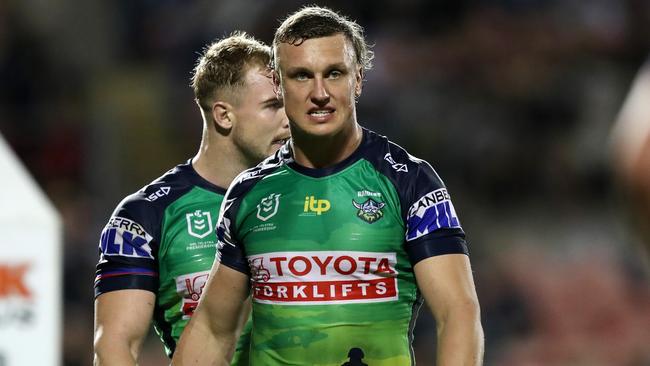
NRL
Don't miss out on the headlines from NRL. Followed categories will be added to My News.
Not a lot remember Adrian Bubb, which is the pity. He was a tough, red-headed prop for Newcastle, as strong as a cattle, who was always up for the fight, right to the very end.
Earlier this month Bubb, who teammates called Bubby, entered hospital with cancer and the result was not good.
At the funeral soon after, many former Knights turned up to honour their teammate, a man few else around the game remember, but a man they will never forget.
Many stories were told after the funeral.
It says a lot about a man whose first-grade career amounted to one game, a Sydney afternoon when he turned up to Leichhardt Oval to play reserve grade and the first-grade squad was in for a tough afternoon and thinning by the minute.
And there was a story in that, when weighed against the game today, that gives us an idea of what there was and what is missed and asks the question whether the game really is changing for the better.
It was 1988 and the Knights were in their first season, running 15th in a 16-team competition after 17 rounds.
Balmain were seventh in what was a crowded ladder. In something of an oddity, they were just two points behind competition leaders Canberra, and the Knights travelled down the highway to take on a Balmain pack that had five internationals — Benny Elias, Steve Roach, Wayne Pearce, Bruce McGuire and Paul Sironen — and another hell of a player in David Brooks.
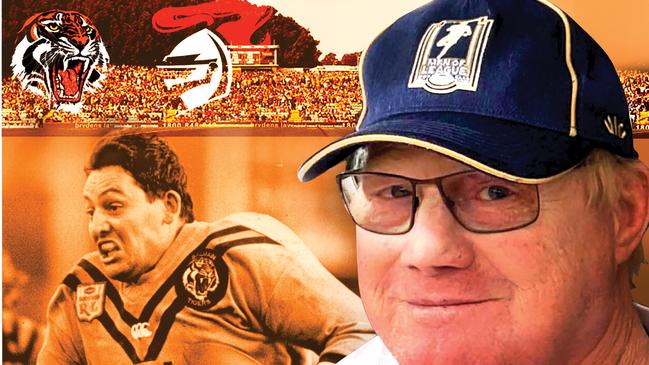
By the time the Knights ran out that afternoon their pack was very different from how it looked in the program.
A couple of Knights pulled out before the game for reasons, Matthew Johns recalls, that caused a few sideways glances among the Knights coaching staff.
“They tried to call a few up with, well, lukewarm responses,” Johns says.
A prop in reserve grade was pulled aside, for instance, and asked if he was ready to play first grade that day.
He looked at the program and all those internationals opposite him and said he would need a week to get ready.
With that they slumped and went over to Bubby and gave him the sell.
“Do you think I’m ready?” he asked finally.
“We wouldn’t be asking if we didn’t think you were ready.”
So Bubby nodded and was called up to debut as starting prop. By way of historical moments another young kid, also playing prop, was also named to debut that day on the bench. He was Paul Harragon.
Anyway, what happened shows how much the game has changed, and not necessarily for the better.
Large blocks of football education are being missed nowadays.
So many teams play cookie-cutter football nowadays, copying what they see the better teams do, hoping they can repeat it long enough or well enough to snatch a victory, all while trying to recruit their way to success.
Football education is missing. How else do you explain footballers jumping on a dropout that hasn’t travelled 10m, or a fallen player who believes getting up and diving over the tryline constitutes a double movement?
Nobody wants to be Wayne Bennett anymore, coaching the man before the science.
Nowadays they talk the lingo, that results are about completions and momentum and playing the full 80 minutes.
As Bennett himself said of the coaches, one of us coughs and we’ve all got a cold. So often teams try to beat other teams the same way those teams are trying to beat them, with little variation in style or game plan.
The Tigers were a curious team back then. They were tremendously tough with a pack that put a fright in more than a few, good enough to play Canterbury in the grand final just a few months later.
Coach Allan McMahon and assistant Allan Bell also recognised that, unlike most teams, the two great threats in the Tigers were Elias and Roach.
“They were the halfbacks,” Bell says.
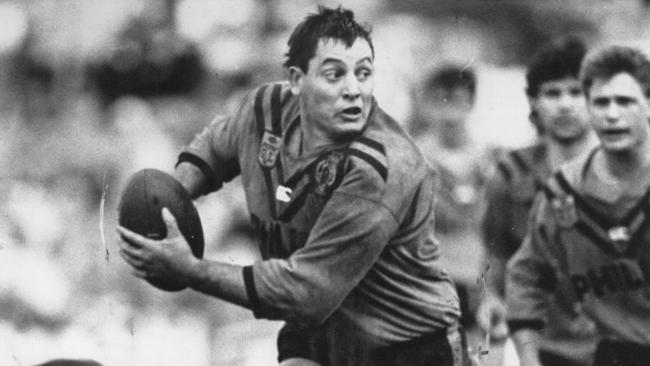
It could never happen today.
It was an anomaly, but Balmain relied on Roach’s experience and uncommon nous to be the playmaker in the team, alongside Elias’s smarts out of dummy-half.
“I used to call the plays because Benny always had his head down at dummy-half,” Roach says.
The Knights believed the key to winning was to throw Roach out of rhythm.
They needed Bubby, a rookie about to play his first game, to dull his edge. They wanted him to play tight because the Tigers’ pack were straight runners, except for McGuire, who had footwork, but if he could play tight the straight running Tigers’ forwards would play into his sweet spot.
Besides, what choice did they have?
First they needed to word him up.
“First scrum,” Bell said to Bubby, “we want you to pack in against Blocker.
“Now, he’s going to smile at you … and then he’s going to headbutt you.
“When he does, you headbutt him back.”
It was about respect, they said. The young rookie had to earn it against the toughest prop in the game because Roach was going to test him, that was the jungle law, and if he faded he was going to be mincemeat the rest of the afternoon.
Then the Knights’ coaching staff revealed their smarts.
“But don’t get in a stink with him,” they said.
“Roach was the toughest prop in the game,” says Bell. “But Bubby was a big, strong bugger and we thought he could wrestle him.”
So they told Bubby that every time the scrum broke up they wanted him to grab Roach and drag him to the ground.
Wrestle him for as long as he could. It would force Roach to get up from the ground and join the set late, which he was charged with organising, and maybe it could even confuse the Tigers in those early tackles.
It would throw Blocker from his rhythm, they believed.
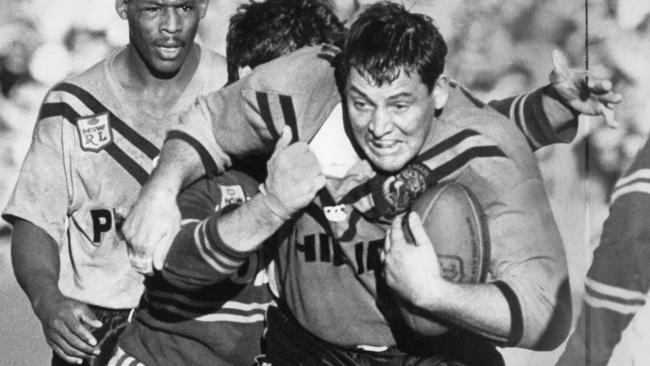
Against that pack the Knights went up against them with a pack made from Bubby, Scott Carter, James Goulding, David Thorne, David Boyd and Marc Glanville. Unheralded, but they knew what they stood for.
And they nearly did it.
Not through dragging their team through mind-numbing completions, or cookie-cutter footy done better, but because they were innovative and attacked Balmain’s strength, hoping what they had would be enough and would be smart enough in the end.
It finished three tries apiece but they lost 18-16, a missed conversion the difference.
Even today they still dispute the result, claiming Glenn Frendo scored a legitimate try late before Garry Jack rolled him on his back and referee Bill Harrigan ruled him held up.
Bubby gave his best that day.
After the game Roach walked off and shook his head at Tigers trainer Brian Satterley, saying, “Who’s that big red-headed young bloke? Gees, he’s a tough bastard.”
Bubby never played another first grade game.
That was it, his one and only.
He played in reserve grade for many more years afterwards, the Knights aware that what he brought to the club was something greater than the sum of his performance, that everything they believed they wanted their club to be was there in that afternoon at Leichhardt Oval, against the best prop in the game.
They turned up at his funeral earlier this month to honour that.
At work this week, Blocker was asked about Bubby and he struggled to remember the game, but he laughed at the story.
Then he paused and shook his head, his face turning serious.
“Bloody cancer,” he said, and everyone nodded.
WHY THE NRL SHOULD LOOK AT JACK WIGHTON DEAL
In the 26 seasons the NRL has been running there have been 15 seasons where at least one team, and sometimes two, have committed serious and systematic salary cap breaches.
Canterbury (2000-2002), New Zealand Warriors (2004-2005), Melbourne (2006-2010), Parramatta (2016), Manly (2014-2018) and Cronulla (2014-2015, 2017-2018).
In almost every other season the cap has been breached by as many as five teams, but sometimes accidentally, or inadvertently, and they have received a fine but no competitive penalty.
Earlier this season, Brandon Smith’s manager Stan Martin said a club “offered me a backhander” for Smith’s signature. It was said on the record, in a wide-ranging interview, and Martin felt no pressure to clarify from the NRL.
Instead the NRL’s response was to send a warning to all 17 clubs. No investigation or request to Smith for more details.
A SMH poll last year revealed 23 of the 30 club chief executives and chairman who answered the question believed that other clubs were cheating the salary cap.
Not their club, but the others. More than two-thirds.
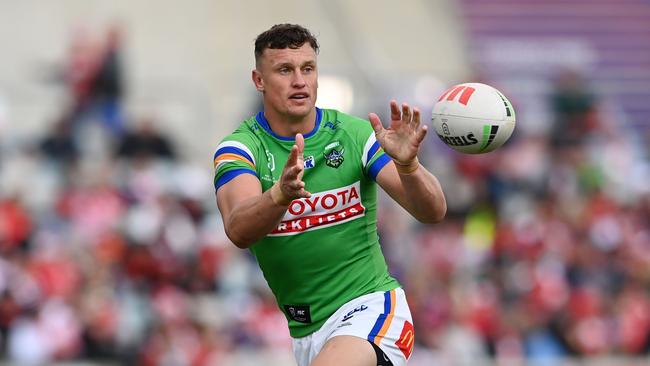
The NRL tells me NRL auditors do an exhaustive job and investigate every seeming anomaly.
Yet, in each of those systematic breaches above the NRL became aware of the cheating by a whistleblower and not a discovery through their own investigations.
Now, when I query Jack Wighton taking a $300,000 pay cut next season, and about $1 million overall, in what is likely his last ever NRL contract, to sign with a rival club instead of staying at the place we heard he spent 14 happy years, apparently, the critics cry like little girls with torn skirts.
There is no suggestion of any wrongdoing by either South Sydney or Wighton. I just said it needs to be properly looked at.
But hey, he wants to win a comp, they say, so let him go.





